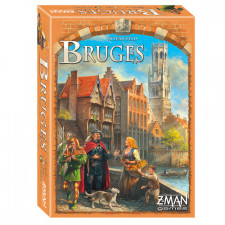Bruges Review
on Jun 17, 2015
Just like you can smell a Uwe Rosenberg game (the Agricola guy) from a mile away, you can usually spot a game designed by Stefan Feld. Aside from his fondness for "point salad" (games in which nearly every action provides a smattering of victory points), Feld's signature is some sort of wacky mechanism to determine the players' available actions. While you can't say luck plays a huge role in Feld's designs, he certainly embraces randomness, from Castles of Burgundy's dice to Amerigo's cube tower.
Bruges is a Stefan Feld game through and through...but does it embrace randomness a little too much?
Contrary to what those who may have seen In Bruges, players are not foul-mouthed Irish hitmen on the run from the law. Instead, they're...well, it's not really clear, or important. You will be building canals and houses, recruiting the aid of nobles, tradesmen and thieves, and advancing your reputation in medieval Bruges. (Bruges, in Flemish Belgium, is the most intact medieval city in Europe and is known for its canals and distinctive stair-step architecture.)
Bruges the game is anything but medieval. It's driven by a gigantic double deck of person cards, each one unique. These cards are used to accomplish every action in the game, from erecting houses to earning coins or digging canals. Every round begins the same way: each player fills his hand with 5 cards drawn from either or both of the two piles. While drawing, only the color of the card is visible.
After everyone has drawn, the first player rolls 5 colored dice (not coincidentally, in the same 5 colors as the cards). These dice basically set the conditions for the round, determining the cost to advance on the Reputation track, the coin payout (in medieval guilders) for each card by color, and which Threats get handed out to players.
Here's where the front of the cards becomes relevant. The main way to score points in Bruges is by recruiting persons, a different one on each card, each with his or her own point value, cost and special ability (in one-time-use, once-per-round, and always-active varieties). But recruiting is not a one-step process. At the minimum, you'll need an empty house and some cold, hard guilders.
To build a house, you need to play a card face down and discard a worker meeple in the card's color. To get workers, you need to discard a matching colored card. And to get guilders, you can discard a card, earning coins equal in value to the matching colored die.
Those are the core actions, but you have a few more options. You can also discard a card and pay a coin to build a canal segment (again, color matters). Completing an entire canal nets an impressive VP reward, but it never feels fully integrated with the rest of the game. On the other hand, you can also discard a card to get rid of a Threat of the matching color (and score 1 point because, well, it's a Feld game). While they're usually safe to ignore, if you let 3 matching Threats build up, you must suffer the painful consequences, from Plague (lose a Person) to Riot (lose all you workers).
These multiple card uses are exactly what make Bruges so modern, strategic, and occasionally frustrating. The person cards all have tempting abilities and intriguing synergies, but you can seldom play more than 1 or 2 from each hand. It's simply heartbreaking to have to spend the majority of them on coins, workers and houses. Adding salt to the wound, you must play four of your five cards each round, which means you only have the luxury of holding on to one single person from round to round.
It's a fascinatingly intricate design, as you might expect from Feld, but there's something slightly off about it. Because each person is unique and draws are almost completely blind, luck of the draw plays a significant role, and the deck can screw you in all sorts of ways. You can run into a stack of five brown cards in a row when all you need is blue for your next canal. If you do draw a varicolored hand, you might roll 1s or 2s on every die except the one color you didn't draw, leaving you bankrupt for the round.
Most importantly, though, there's no way to improve your odds of drawing a specific person or even class of person. Many cards scale their payout based on the group symbols on your other recruited people, but it's pure luck whether these cards will pay off. If you happen to draw one while you have a tableau full of that person type, you've probably won the game. But you can't build a strategy around this, or any other kind of synergy, for that matter. You just have to do the best with what you're given and hope your opponents were no less screwed.
I would play Bruges whenever someone offers, but I just can't recommend it. When it comes to Feld, Castles of Burgundy and Trajan are tighter. When it comes to tableau builders, Race for the Galaxy offers a lot more luck mitigation. Unless you plan to pick up the City on the Zwin expansion, which introduces various deck-mining abilities and integrates the Canal action a bit more, don't waste your time with Bruges; there are simply better games out there.

 Customer Support
Customer Support  Subscribe
Subscribe 




 Account
Account  Wishlist
Wishlist 

